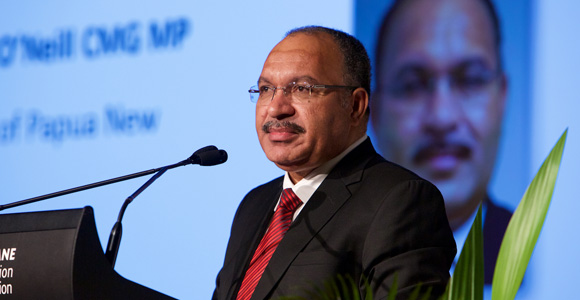The level of domestic violence in Papua New Guinea is ‘simply unacceptable, it is a shame on our communities and it is a shame on our nation’, according to Prime Minister Peter O’Neill. In a speech marking White Ribbon Day last week, he called on leaders in business, communities and the professions to take a lead in eliminating domestic violence. The following is an edited extract of his speech.

Prime Minister Peter O’Neill
We need to make the elimination of violence against women and children our primary goal and a top priority in our country.
Research by the UN Women’s Agency reveals that as many as two out of every three women in Pacific Island nations, who have been in a relationship, experienced domestic violence during their lifetime.
But in fact it may actually be even higher, as the statistics on the level of domestic violence in any society are inaccurate.
Domestic violence is a crime where victims do not always report what has happened to them.
‘Eliminating violence against women and children is a responsibility of all communities.’
Sometimes this is because of the fear of further violence, sometimes because of a feeling of shame, and sometimes because police will not listen to them.
Whatever the ultimate statistics on domestic violence, the fact remains it is so high.
This is simply unacceptable, it is a shame on our communities and it is a shame on our nation.
It cannot be ignored.
Eliminating violence against women and children is a responsibility of all communities.
Progress
At a government level, we have increased spending on policing, and we have increased spending on the judiciary to better deal with such cases. We have also implemented a number of measures, including the passage of the Family Protection Act two years ago.
This was designed to enhance the status of women in our communities—in business, in sport, in careers and generally in communities and families.
‘The men of Papua New Guinea—young and old, rich and poor, educated or not—must make a stand against violence.’
Enhancing their role and status is a fundamental right and it is cultural change that is very much needed to prevent violence.
This work being done by groups such as the Coalition for Change, and by women’s groups, and youth groups in our nation. This is delivering substantial progress.
Ultimately though, eliminating domestic violence is not just the responsibility of government or government agencies.
Men’s responsibility
Eliminating domestic violence against women and children is the responsibility of men. And it must be driven, above all else, by men.
Men who abuse women and children have to wake up and know that what they are doing is wrong. Men who know of other men who abuse women and children must stand up against abusers.
This kind of abuse against our most vulnerable is against all our Christian principles.
The men of Papua New Guinea—young and old, rich and poor, educated or not—must make a stand against violence. The men of Papua New Guinea must, by our example, by our advocacy, and put an end to domestic violence in our country.
Leadership
National leaders—members of the National Parliament, ministers of state, senior public servants, and members of the disciplined forces—must set the right example by our own behaviour.
The men who hold responsible positions in traditional society across the nation—and they number several thousands—must set the right example as well.
It extends to all leaders: leaders in business, leaders in communities, and in our professions.
‘We must continue to address the gender imbalance in the workforce, especially the public service, and more so in the disciplined forces.’
It must also include leaders of our sporting bodies, charitable organisations, church and community groups.
We also need to implement more initiatives to deal with the root causes of domestic violence. These include addressing the violence caused by excessive drinking, and by drug abuse.
Status of women
We must continue to address the gender imbalance in the workforce, especially the public service, and more so in the disciplined forces.
We must also, as a central part of this agenda, continue to enhance the role and status of women in the life of our nation.
We can achieve so much in this nation. But we can only do so if we respect one another.
Together, mothers must teach their sons to respect women. Fathers must lead by example and be role models so their sons know that violence against women is not acceptable.
The nation must empower women and make them feel safe in their own country.
I invite each and every one of you to join with me and your countrymen and women, in committing to this great challenge.
It is simply a matter on which we cannot afford to fail.
The Hon. Peter O’Neill CMG MP is Prime Minister of the Independent State of Papua New Guinea. This is an edited extract of his speech. For the full text, click here.









Speak Your Mind